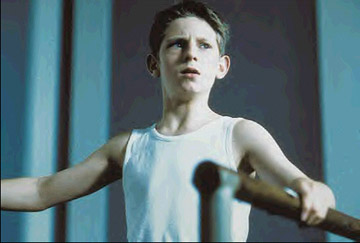

After a summer of extraordinary difficulty getting the "On-Line Reviews" on line (don't ask!), I think it is safe to write that if you have found this review you probably already know the general story of Billy Elliot: 11-year-old Billy Elliot (Jamie Bell), brother to a tough coal mine strike leader (Jamie Draven), and son to their almost-equally tough striking coal miner father (Gary Lewis) discovers through a dancing teacher (former Oscar® nominee Julie Walters) that he is better at ballet than boxing. As fans of Danny Masterson know, the concept of boxer as ballet dancer is hardly new. What is new is that writer Lee Hall, director Stephen Daldry, director of photography Brian Tufano, choreographer Peter Darling, and company have transformed this old idea into a genuinely exciting movie. The skilled artisans behind the camera have organized the uniformly excellent cast of this film into an ensemble who make Billy Elliot one of the best films of 2000 -- what a way to wrap up a century of British film-making! -- and an instant classic of coming-of-age stories.
Gosh, that reads like trite, "sound bite," drivel! Let me put my opinion of Billy Elliot into perspective: leaving the theater I said (and I quote myself here), "At least five Golden Globe® nominations, at least three Oscar® nominations, and at least one likely Oscar® win." It was not for nothing that I mentioned the behind-the-camera people along with the stars in the lead paragraph. Unless the end of this century sees some last-minute, year-end releases of films like Shakespeare in Love, which will sweep up awards nominations like a Hoover®, Billy Elliot will clearly be a major contender for cinema awards in 2001.
Canal+ having recently acquired Universal Pictures (the film's distributor in the United States), it is highly unlikely that they will allow any other studio to buy the awards for which Billy Elliot will be a hot contender in one of those uncontested, insufferable advertising blitzes which we in Southern California have to endure every spring. Billy Elliot would ordinarily be a sweet little art house picture which awards voters will love, but which no one will go to see theatrically. With the muscle of Universal Pictures behind it, Billy Elliot will probably see very wide release and win hearts all around the world.
What is to like about Billy Elliot? Pretty much everything. Performers Stuart Wells (playing Billy's mate, Michael) and Nicola Blackwell (playing Debbie Wilkinson, the young daughter of Billy's ballet instructor) typify the level of the acting in Billy Elliot: while Jamie Bell turns in an Oscar®-worthy debut as the naive Billy, who slowly comes to terms with adolesence and the harsh realities of how the adult world can interfere with childhood dreams, Wells and Blackwell play savvy, worldly-wise kids who already know what they want and aren't afraid to express themselves.
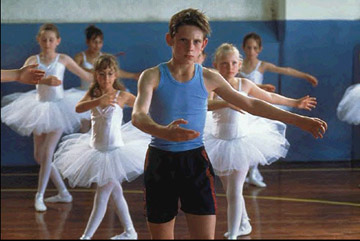
In one scene in particular, Nicola Blackwell plays Debbie as an innocent coquette trying to seduce the almost-clueless Billy as young children who are "experimenting" are wont to do. The result is a scene of stunning eroticism matching anything Nabokov ever wrote about in Lolita. There's no nudity; no sexual activity; nothing that would offend anyone who doesn't need offending -- but with a single medium range camera shot, a few tender glances between the young performers, and a simple gesture, Bell and Blackwell give director Daldry's audience more emotional intensity than Stanley Kubrick, Tom Cruise, and Nicole Kidman packed into all five hours (or was it fifteen?) of Eyes Closing in Sleep. Daldry brings out a quality of acting and a level of audience emotional involvement sweeter, more touching, more heart-warming, and more sensual than many more-experienced directors have wrung from more famous actors in decades. While not as . . . ah . . . "hot" as the eating scene in 1963's Tom Jones from Tony Richardson, the aftermath of the pillow fight between these two children is certainly destined to go down as one of the great audience make-out moments of all time. Editor John Wilson should be given credit for cutting the scene to exactly the right length: a few seconds shorter and it would have been a meaningless throw-away bit, a few seconds longer and it would have been tawdry; as it is, it is a high point of recent British cinema and one that audiences will long cherish.
Michael, as played by the youthful-looking Stuart Wells (who is really 17, by the way), is not just "exploring" -- he already seems to know where he is headed, and as he slowly shares his private life with Billy, he helps Billy to define himself. Their's is a harsh coal mining town in County Durham, where life is so tightly bound by tradition and a sense of machismo (agravated by harsh economic conditions and police repression of the strikes which occured during Margret Thatcher's Conservative regime) and of such provincialism that at one point Billy admits that he has never even seen Durham's world-famous cathedral. Michael helps Billy to see that there is a wider world than the narrowly focused, futureless career of coal-mining in a town in which the coal miners themselves have become (in the British phrase) "redundant," transformed from fairly prosperous workers into desparate strikers whom it is no longer economically feasible to pay "a living wage." Although Billy realizes that Michael's path is not his own, he does learn from Michael that he can create a new path for himself, and Billy decides, against the strenuous and often violent objections of his father and brother, that ballet is his path out of the grinding life of a coal miner whose standard of living is destined to worsen from year to year.
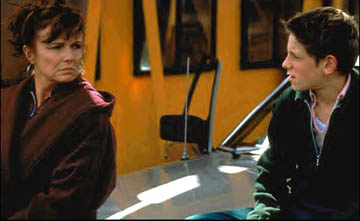
Secretly tutored by Mrs. Wilkinson, Billy is unable to even explain just why he likes to dance, but dance he does, and those who love him are forced to recognize that it is only in dancing that Billy finds true happiness. Listening to music from Tchailovsky's "Swan Lake" one day, Billy, ever innocent, asks "Miss" if there is a story to go with the music. Julie Walters then proceeds to briefly explain the story of the swan who is transformed for a few hours every night into a human being, one who can be set free if only the young prince will love her. . . .
We as audience members know that to her "Swan Lake" is a parable of her own life, and we know that she knows that its sad ending will also turn out to be a prophecy of Billy's own life if he is not free to dance like the swan, but there is absolutely no descent into maudlin sentimentality here -- "Miss" ends the story crisply and abruptly and discusses it no further, knowing that she has sown the seed of Billy's own self-realization without dragging him down by going into details about her own unhappy life. She knows how deeply Billy needs to dance, even if he himself doesn't know, but director Daldry and screenwriter Lee knew that any further discussion of "Swan Lake" by "Miss" would cause her to unduly influence Billy's own decisions and self-discovery, so they allow the parable to end with no explanation, as a good parable should end. Billy will figure it out eventually. . . .
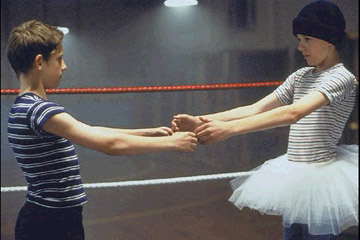
Billy's innocence is priceless, and Daldry and Lee, although never hesitating to expose him to the harshness of life in his small town, never forcibly strip him of his innocence. Even though he himself, a day-dreamer in school, is unable to articulate why he fells that he must dance, those around him realize that dancing is changing Billy. When his father first discovers that Billy has been practising ballet instead of boxing, he admonished him that real boys should not be dancing ballet, they should be playing football, or boxing, or wrestling -- engaging in "men's" sports; too young to realize that his father is suggesting that "ballet is Gay," Billy instead expresses astonishment that blokes wrestle each other as sport, unwittingly turning his father's argument upside-down and leaving his father speechless. Debbie has explained to Billy that male dancers have to be strong and have endurance, just as professional athletes do. Billy knows from personal experience that ballet is more physically demanding than boxing. He does not grasp that his father and brother are questioning his "manliness" when they object to his dancing, but he is not utterly clueless about life: at one point, in a completely unrelated context he explains to Michael, "I'm not a poof," but when he is actually seen dancing with Michael (to the unutterable horror of his father), those who love him finally begin to realize that the Dance is the great love of his life -- they need not worry about Billy falling in love with another boy, for he already has a mistress -- the Dance.
At this point in a story, a movie audience can usually expect either of two things to happen: either the protagonist will be completely rejected by his family or else they will be totally swept up in supporting him and everyone will live happily ever after, lah dee dah. Billy Elliot is no ordinary movie: as expected, Billy's father does, of course, support him, but the Elliots are no storybook family -- they can't simply make a wish and have Billy's dreams come true. Billy has won the first round of his fight, but the second round must be fought by his father and brother and their friends -- against the relentlessly encroaching poverty which grips their lives in a stranglehold of despair from which only Billy seems to be able to escape. To win that fight, they will need money, and there are only two ways open to them, as honest men, to get money -- either sell off what little they own, or disgrace themselves by breaking the strike which they themselves have vigorously (sometimes violently) supported. For their little fledgling swan to grow into a happy man, they must, phoenix-like, destroy themselves.
With the entertainment industry in the United States facing its longest-ever work stoppage, the SAG-AFTRA strike against producers of television commercials, what happens next is truly gut-wrenching for anyone who has ever had to live through any sort of labor strike, and is certain to endear Billy Elliot to large numbers of awards voters in Hollywood and New York: Gary Lewis, playing Billy's Dad, must make the critical decision to either cross the picket line which his elder son leads and "scab" to earn money for his younger son's future, or else he must honor the strike knowing that doing so may destroy Billy's hopes for a better future and blast his present life with harsher and harsher financial hardship.
A strike by coal miners may seem an unlikely backdrop for a story about a young boy who wants to learn ballet, but Billy Elliot, harkening back to the great "kitchen sink" films of '60s British cinema, shows that life goes on for ordinary people even if they are being carried along on the tide of significant historical events. Lee and Daldry do not concentrate on the strike any more than William Shakespeare concentrated on the constant gang warfare in the streets of Medieval Italy in telling the story of "Romeo and Juliet," but, like Shakespeare, they do not ignore the fact (as film makers often do) that characters do not live their lives in a vacuum. Without the street fighting of Verona, the romance between Romeo and Juliet would have been nothing more than an adolescent "crush," which both of them would have got over in a few months. Without the stark poverty and vicious police repression of the coal strike, Billy's story is the same as that of any other boy who wants to do something of which his family disapproves.
By telling Billy's story in the context of the coal strike, Lee and Daldry add a certain amount of epic tension to the story which makes Billy Elliot a gripping film, even if it is more a comedy than a drama. From the opening seconds of the film to its conclusion, Billy Elliot grabs its audience again and again and makes them want to see what is on screen and to want even more. When I left the theater, many members of the audience, which included a large number of film critics, mind you, commented that they wanted an immediate sequel -- Billy Elliot in his teen years. The film makers have followed the dictum of Gypsy Rose Lee to the letter: "Always leave 'em wanting more!" and they have done it quite successfully.
Much of the credit for this gripping quality of Billy Elliot must go to cinematographer Brian Tufano, director Daldry, and producers Greg Brenman and John Finn. The producers could have spent millions of dollars of Arts Council National Lottery money making a film with special effects up the wazoo ("Oh, look, there's Lucy Liu pretending to be Keanu Reeves in Charlie's Matrix!"), but instead of hiring technicians to make an over-blown movie which could have been filled with over-priced special effects action sequence after over-priced special effects action sequence to illustrate the strike, instead of hiring techno-geeks to churn out frame after frame of computer-generated images with the inspirational quality of rat droppings, they opted for simplicity and hired cinema artists.
Tufano and Daldry don't give us burning cars exploding during the frequent clashes between the police and the strikers, they don't give us an excruciatingly slow, effects-ridden, multi-million-dollar slo-mo shot of a key striker being beaten to the ground. To express the magnitude of the strike's significance in the lives of the characters they do not rely on the frequent violent street clashes, but rather on one casual tracking shot of Billy and Debbie walking down the street, as Debbie drags a stick along at her side, first over a placard-covered wall and then over what seems (at first glance) to be the surface of a shop window. When the camera continues to follow the two children on their leisurely stroll, the imagery that is gradually revealed is more shocking to the audience then any street fight could possibly be. In a single scene with one simple camera shot Tufano and Daldry explain more about the lives of these children and the angst of Billy and his family than a half-hour of dialogue or ten million dollars worth of mine cave-in scenes or burning car shots could ever hope to do.
The opening moment of the film could have been of a striker being beaten down by mounted policemen, or it might have been a slow-motion shot of Billy's head snapping to the side as someone else's boxing glove knocks a spray of blood and spit from his mouth (and how many times have we seen that scene in a boxing movie, eh?). Instead, it is a tight close-up of a record player on which someone (we don't even know who) is about to start playing a disk. The audience's curiosity is piqued immediately, and Billy Elliot doesn't let go of its viewers from that moment until its very end.
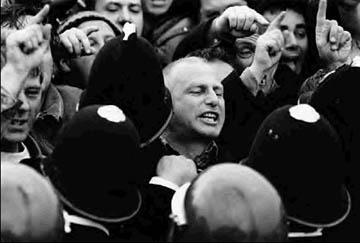
Billy Elliot is an elegant little masterpiece -- look for its cast and crew to be sitting in the audiences of next year's awards shows, waiting to pick up their prizes for their superlative work.
On a scale from Zero to Ten, I give Billy Elliot a solid eight.





O MUSE WITH THE JAUNDICED EYE, TAKE ME HOME!
